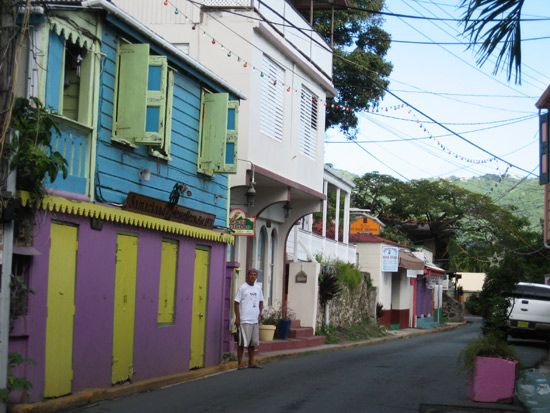Either I’m a masochist, or I enjoy sleeping sitting up on twelve-hour trans-Pacific flights. On a visit to Tortola to ring in 2010, I realize that I have been running away from bitter, northeastern American winters to beaches on the other side of the world while warm paradise was just a short four and a half hours away.
Despite this proximity, Tortola seems like a world away. One of the small British Virgin Islands in the Caribbean Sea, it has one traffic light, chickens running around freely, and the slow island vibe I desperately crave after hustling through New York City’s rat race. Even language is spoken slower in Tortola. Who can be bothered with verbs or tenses? As I settled into the sun-and-sea lifestyle, I quickly realize I can’t.
I come to visit my cousin Branson, who is actually a belonger. “Belonger” is the word used to describe citizens of Tortola. Branson’s mom is American and his dad is British, but they happened to be living there when he was born. He is blond and blue-eyed and has spent many years living in other parts of the world, so he’s not your typical Tolan (as the locals are called).
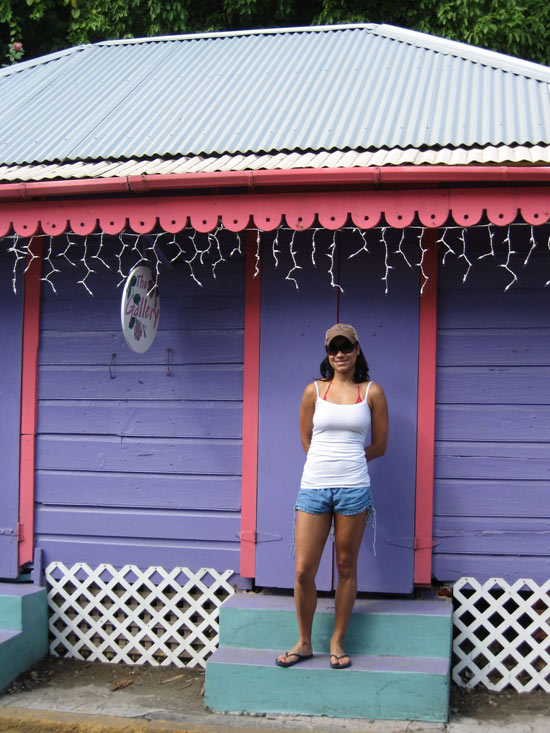
I haven’t seen Branson in several years; we were never very close, but I am excited to get to know him better. I am a little concerned though about spending a week with a virtual stranger and sharing his small bedroom. Branson is younger than me by several years, and I remember him annoying me and his sister when he wanted to play with us. I cross my fingers that maturity has set in, for both of us.
As I sit in the ferry from Saint Thomas, Tortola’s neighboring U.S. Virgin Island, soaking in the welcome sun and basking in the humid air, I wonder if Branson will be waiting for me at the dock or if I am to depend on a crumpled sheet of scrap paper with hastily jotted down directions to The Pub. I am to wait for him there if he can’t leave work early enough to meet me at the dock. But for now, I forget my anxiety about navigating the island solo and instead lose myself in the boat’s rhythm on the waves and in the mountainous terrain. As the dock at Roadtown, Tortola’s main city, gets closer, I see the figure of a scruffy, tanned young man patiently awaiting the boat’s arrival. In a baseball cap worn backward, worn-out flip-flops, and baggy board shorts and T-shirt, Branson looks exactly the same as I remember him. I smile in relief at the ease with which I recognize him. I see a similar smile on his face after he sees my furious waving and recognizes me easily too. On some level, I think we feel comfort in the hope that if neither of us has changed significantly on the outside, we probably haven’t on the inside either.
“You’re so dressed up,” Branson comments after looking at my outfit of jeans, high-heeled sandals, tank top, and baseball hat. Even though I want to protest that this is extremely casual where I come from, I don’t. I settle into the island vibe and make a mental note to put my jeans and heels at the bottom of my suitcase.
We walk from the ferry dock to Branson’s house, ducking hibiscus trees and making small talk along the way. Branson lets me know that I will go to work with him every day during my week-long visit. Even though we are getting along well so far, my earlier concerns reappear. I had prepared myself for six nights in a small one-bedroom house with a virtual stranger, but my heart stops at the thought of seven days out at sea together too. Then I find out where Branson works, and my concerns instantly vanish into the warm, hibiscus-scented island air.
Branson works on a charter boat, sailing tourists around the British Virgin Islands!
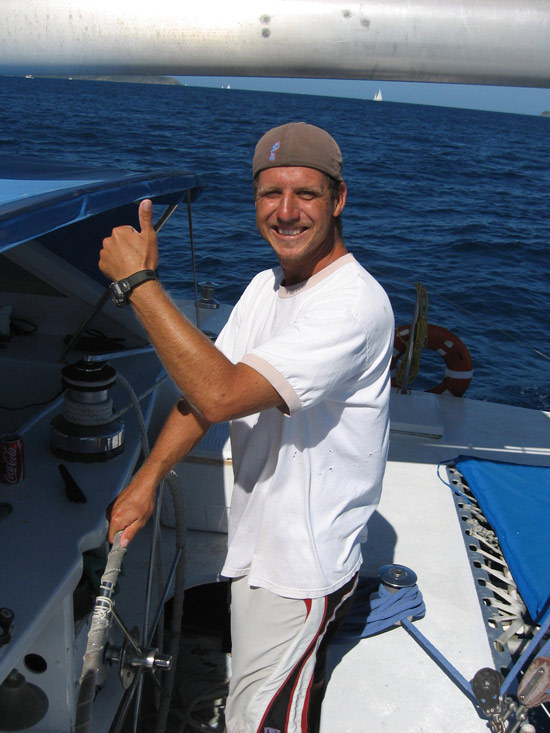
I spend my days lying on the boat’s trampoline; it is my favorite spot and where the only thing separating me from the clear, beautiful water below is a thin piece of foam above a rope net. I do also learn about sailing and help out with some of the labor. Spinnaker, hull, monohull, jib, storm jib … Branson quizzes me daily on the parts of Shamwari, our beautiful catamaran whose name means special friend in Swahili.
On the days when Shamwari is full with guests, I explore the island on my own and, with Branson’s guidance, do my best to blend in. He teaches me the proper way to hitchhike around on boats and cars. When trying to get a ride, the needy thumb-up is unacceptable, and my cousin makes me feel like if I am going to do that, I would be better off writing “tourist” across my forehead. Instead, I am instructed to act as if I don’t really need the ride—I can take it or leave it. So, I stand, aloof, at the side of the road with my fingers in the L-shape of a gun. It works, and although no one would have mistaken me for a local, I am glad that I am saved from the embarrassment of the thumb-up.
When I can join on the sails, I learn about the many British Virgin Islands; I already know that Branson is named after Virgin founder Richard Branson, who actually owns one of the islands, but I hadn’t realized how many more islands there are. The islands have endearing and sometimes logical names, like Salt (an island that once exported salt), Beef (where cattle previously roamed), Copper, Ginger, Dog, Scrub, Norman, and many more.
On Shamwari we visit Virgin Gorda (which means “fat virgin” in Spanish), home to the tourist attraction the Baths. I have no idea what the Baths will be, but since they are one of Branson’s guests’ most-requested destinations, I dream of clear, turquoise seas.
Of course, there are clear, turquoise seas since it is a Caribbean island, but the Baths’ reality makes the water’s beauty recede with the tide. The Baths are where slave traders brought African slaves after crossing the Atlantic. It’s an area between huge boulders that holds a small, shallow pool of water. Visiting the Baths as a tourist reminds me of people who come to New York and want to go to Ground Zero. Both sites hit home a little too close for me to appreciate them as an attraction.
In Tortola, I am acutely aware of my African ancestry (I have a white mother, Branson’s mother’s sister, and a black-Native American father), especially when I am with Branson—people are very confused about how we are related. I give more genealogy lessons than I care to.
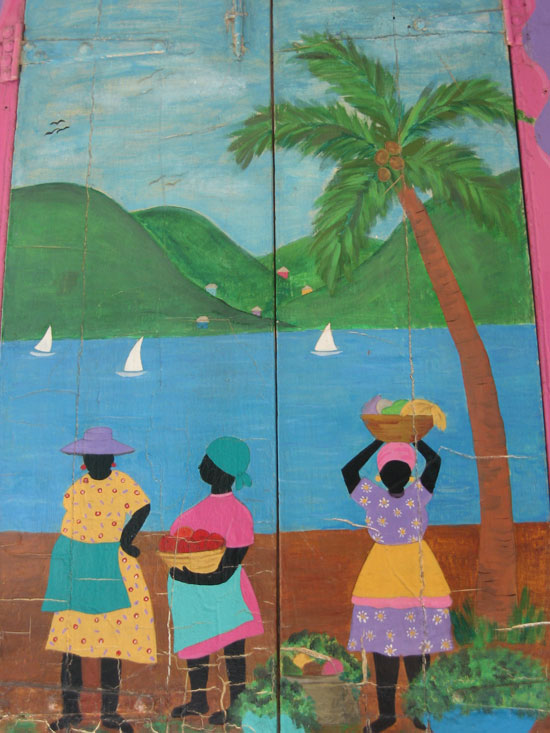
I spent only a week in Tortola, but in that short time I did feel a sense of polarization in the society. The island is almost evenly divided between white expats and blacks from Tortola and other parts of the Caribbean. I struck up a conversation with a man when he viewed the poorly rubbed-in sunscreen on my shoulders with suspicion and asked why I wore sunscreen since I was black. The sunscreen comment didn’t surprise me because there seemed to be a clear-cut line on the island of what things and places were for the black people and which were for the whites. Not all, but many restaurants and bars seemed to be overwhelmingly dominated by one or the other.
Such self-imposed segregation occurs in many places, so I didn’t find it too disturbing, but some attitudes bothered me. I was uncomfortable with the acceptance of men being referred to as boys because of their skin color and despite their age. It is a situation not unique to Tortola, but the phenomenon of outsiders with a superiority complex going to poorer, less-developed countries still grates on me like the sound of nails on a chalkboard. Failure of industry and harmonious living stems from this attitude of trying to control a culture before understanding it or attempting to appreciate its complexity.
Despite this seemingly simple equation of black-white polarization, Tortola has other ethnic groups in its Tolan mix: Latinos from Spanish-speaking Caribbean islands and a sizeable Filipino population. I felt momentarily transported back to the rural island areas of Southeast Asia, where I would see girls with long, straight, black ponytails zip by me on their scooters along winding roads. However, even though Tortola may resemble those faraway places by its population and geography, the nicely paved roads and sidewalks made me quickly realize this was a different type of tropical island. Nonetheless, to the people living there, it did not feel as manicured and maintained as I found it to be. I repeatedly heard rumblings from the Tolans about the corrupt but improving government and the lack of infrastructure improvements until election time approaches. Tortola did not seem unique, as in my experience, such rumblings echo around the globe.
I was surprised and disappointed by how similar Tortola is to the United States in many ways. I hoped and expected Tortola, a tropical island, to have bountiful fresh fruits, but instead it could only offer pricey U.S.-imported varieties. In addition, much of the southern part of the island is very industrial to maintain modern infrastructure and a thriving economy. I stayed on this industrial side, and so instead of going for runs along white sand beaches, my tennis shoes hit hard concrete alongside factories, roads, and gas stations. In my sunscreen-induced conversation with that local Tolan, we discussed the dichotomy of this fertile tropical island that had little agriculture. He opined that while it was tragic that there were scarcely any fruit plantations or even gardens left, it was good because that was how Tortola would advance in the world and be on par with countries like the United States. I appreciated this view and considered it selfish of me to want these islanders to remain behind in infrastructure and technology so that I could have a place close by to visit that offers cheap fresh fruit salads.
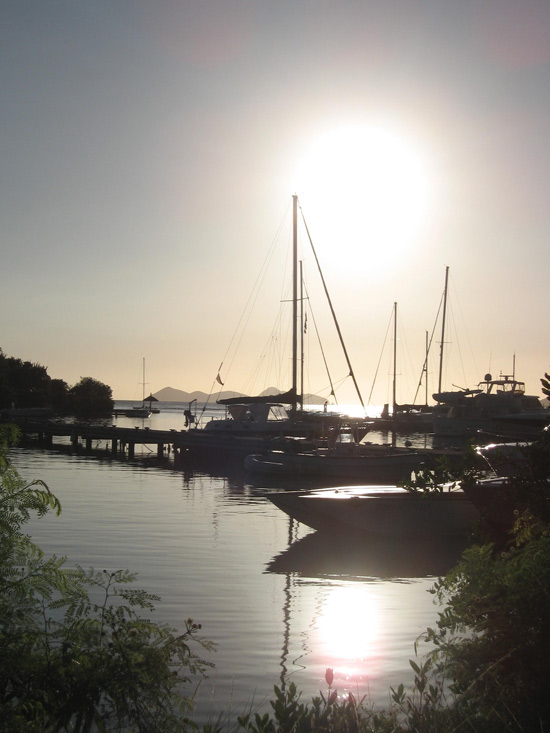
It wasn’t only when I went to the local market and had to buy imported tropical fruit that I lamented on not being able to escape the reality of the world that I had fled and that awaited me post-vacation. After losing myself in a day of amazing snorkeling journeys and sitting in the sun eating ice cream bought from the ice cream boat, I’d try to hide my frustration when Branson’s guests would ask me where I went to college. Part of the attraction for many expats from the United States and Western Europe seemed to be the freedom in Tortola to reinvent yourself. I met people at the local floating restaurant and at expat holiday parties who pitied my life in New York with its business cards and the abbreviations added after my name. They had left this life behind to live on their boats in the sun; once they had sailed away, they never looked back. The backgrounds and diverse experiences of this group of people from all over the world now choosing to become Tolans were astonishing and impressive. Past lives of musicians, war veterans, psychologists, and many others, were recounted to me.
At a New Year’s party thrown by an older, established transplanted American family, I looked around and admired the tanned, healthy faces and relaxed stances of the guests. The eighty-year-old men looked sixty, and the sixty-year-old women donned miniskirts and smiled coyly. The eighty-year-olds knew how to party and broke out into guitar performances throughout the night. One charismatic performer, an eighty-seven-year-old war hero, engaged the crowd with a melody about the importance of marrying someone uglier than you. I gazed in admiration, envy, and disbelief at the guests’ youthful attitudes and appearances, given their ages. But I was quickly alerted to the fact that although their bodies may be intact from the easy island living of sailing and drinking cocktails called Painkillers, their minds were another story. This important detail reminded me that it is not always possible to understand a society or place after only seeing it through a visitor’s eyes.
As a belonger who spent many years of his childhood and now early adulthood in Tortola, Branson is poised to deeply comprehend the appeal of Tortola and the island’s intricacies, dynamics, and people. As we sit at The Pub on my last night, overlooking the marina next to his house and chatting with his former coworkers for an after-work pint, I approach him with probing questions about the Tortolan society. Instead of answering, he playfully responds to each query in a whiny, childlike voice asking “Why?” When I don’t stop asking, he knocks my hat off of my head in jest. I pick the hat up from the ground and smile, thinking back to when we were kids in another part of the world, acting the same way.
I am proud of Branson for finding a place where he belongs and can thrive. Even though people do not think he is a native Tolan when they see him, Branson knows he is; he has found his way home. Nonetheless, he, like many expats in Tortola, ponders a return from the island. Many stay because they worry about whether they can survive in the more constricted life of the U.S. mainland or Europe. Also, there is no real impetus to leave. As we sit at The Pub, one of Branson’s former coworkers, an expat from the United Kingdom who has heard my unanswered inquiries, attempts to give me an answer. He sums up how his one-year contract turned into a twenty-year-long stay here: “It ain’t that great, but it ain’t that bad either.”
I understand his sentiment, and even though I have only been there for a short visit, it seems en pointe to me. As I now plan my spring-break-warm-beach getaway, Tortola is an appealing option because of Branson, its proximity, and my familiarity with it. However, when I am going to travel, I want to go someplace that is great and doesn’t need to import its fruit. I will travel to break from the development of my everyday urban American life—even if it means sleeping sitting up on a twelve-hour flight.
- Follow us on Twitter: @inthefray
- Comment on stories or like us on Facebook
- Subscribe to our free email newsletter
- Send us your writing, photography, or artwork
- Republish our Creative Commons-licensed content

